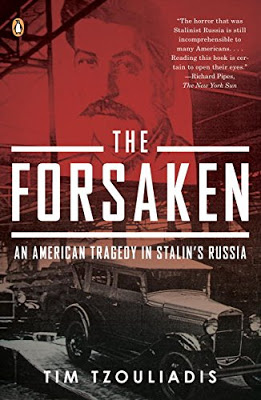One of my students once asked me, “Why do Russians want Stalin back? He was a mass murderer and killed Russians by the millions. Why do Russian people think he was a good ruler?” All I could say was, “Well, if I knew the answer, I would still live in Russia… I moved to Canada, because I can’t justify those sentiments.” Then he continued: “Have you heard about the thousands of Americans who immigrated to the Soviet Union to escape the Great Depression? And they vanished in the Gulag”. Never heard of. To follow-up our discussion, the student, who eventually became my good friend, sent me a gift – a book titled The Forsaken: An American Tragedy in Stalin’s Russia by Tim Tzouliadis.
I thought I knew quite a bit about Stalinism and the Gulag. I had read Solzhenitsyn and Shalamov. My teacher of literature encouraged us, future humanities students, to learn as much as possible about the darkest chapters of the Russian history. My family suffered from the repressions, after all. Yet, the book proved how little did I know.
The Forsaken starts with the introduction of a few individuals who, among many others, left the USA for the Soviet Union lured by communist propaganda and driven by the desperation of the Great Depression. As one reviewer on Amazon said, “many saw the apparent failure of capitalism contrasted unfavorably with the apparent success of the ‘Soviet experiment’ and emigrated freely to join the new socialist state unaware of what the ‘dictatorship of the proletariat’ truly entailed.” History is like a panoramic picture – you can’t make out too many details there or individual faces. But the bigger picture that historians usually strive to provide makes each particular life seem unimportant. Sometimes to comprehend the lessons of history, we need portraits. Tim Tzouliadis portrayed history through life stories of a few American expats, which makes the narration more powerful and gives a reader a fiction-like experience.
I read fast in both Russian and English, but it took me a few months to get through this book. I liked the writing style of Tim Tzouliadis, but what he wrote about was often overwhelmingly gloomy. I had to take a break after each dozen pages. Some episodes were particularly unbearable, so I took longer pauses. When I read about routine tortures or mass shootings “by quotas”, I literally felt the sour smell of blood.
Yet, the book is not about ultimate suffering or the incomprehensible cruelty of the Stalin’s regime. It is not even about the Soviet Union. Not solely about it. It is about little people and great powers playing a great game. And, most importantly, about the justice that was denied to millions of innocent victims, among which are thousands (probably, hundreds thousands) of Americans. “At the end of the war, allied investigators found it difficult to comprehend how one million people could have been killed in a few acres of the Nazi extermination camp at Treblinka. Only after the downfall of the regime, and the arrival of the victorious Allied armies, could the enormity of the crime be revealed—and later, in Nuremberg, a measure of justice brought to bear. In the Soviet Union, there was never a victorious army to expose the consequences of Stalin’s rule; nor would there ever be a Nuremberg. Instead, the victims of Kolyma, and every other terminal point of the Gulag, remained concealed even as the killings continued unabated. In Kolyma, the rhetorical question Joseph Goebbels had asked in his diary actually came true: “For when we win who will question us on our methods?”, Tim Tzouliadis wrote.
If I had a chance to talk to Tim Tzouliadis, I would like to ask him a few questions. How did he manage to get through those archival documents, memoirs and other evidences of the terror (the bibliography section of the book is really impressive)? I know that the people who investigated crimes of the nazi regime often suffered from the nervous breakdowns. How did he find the strength to carry on? Did he try to get access to the Russian archives? Russian authorities still keep documents about Stalin’s crimes classified, but some papers were unearthed during 1990s and early 2000s, this is how I managed to find the information about my family. Did he receive any feedback from Russian readers, and, perhaps, from descendants of those who kept the repression machine running? How did American readers react to this book? Though the author realistically estimated the chances for a Nuremberg for Stalin as very slim, nearly non-existent, is there any hope for a thorough investigation of what happened in the Soviet Union and was persistently ignored by the rest of the world for decades?
And, of course, I would like to thank the writer for his honest book. Your work is very important, Mr. Tzoudialis.

